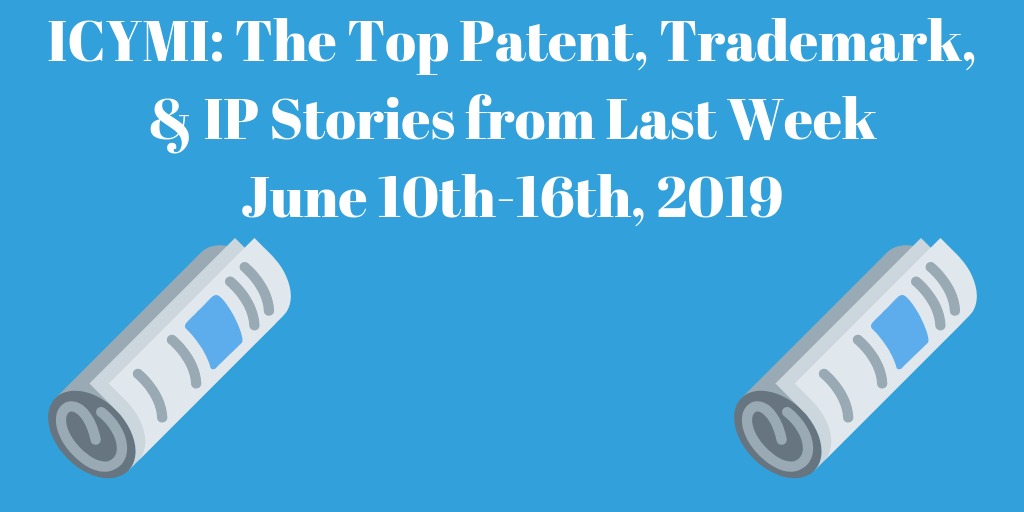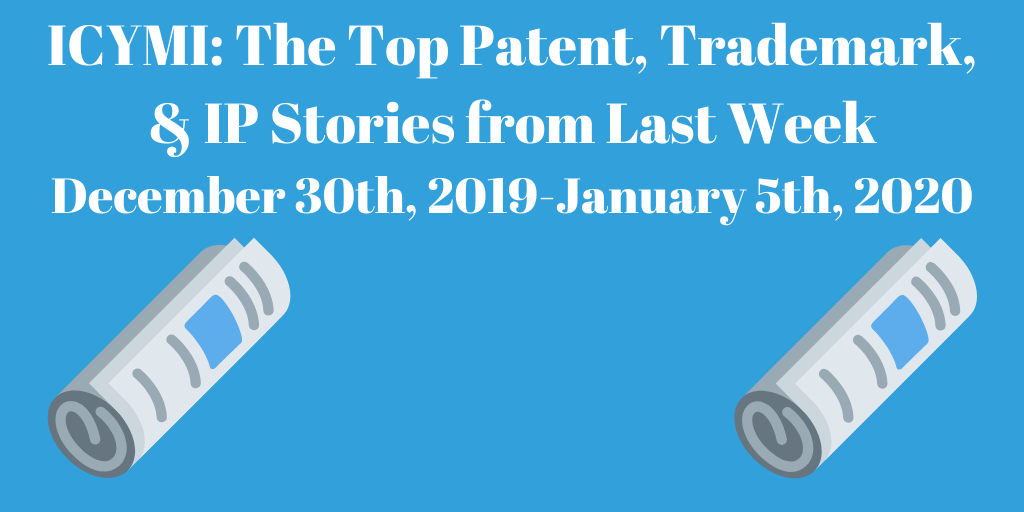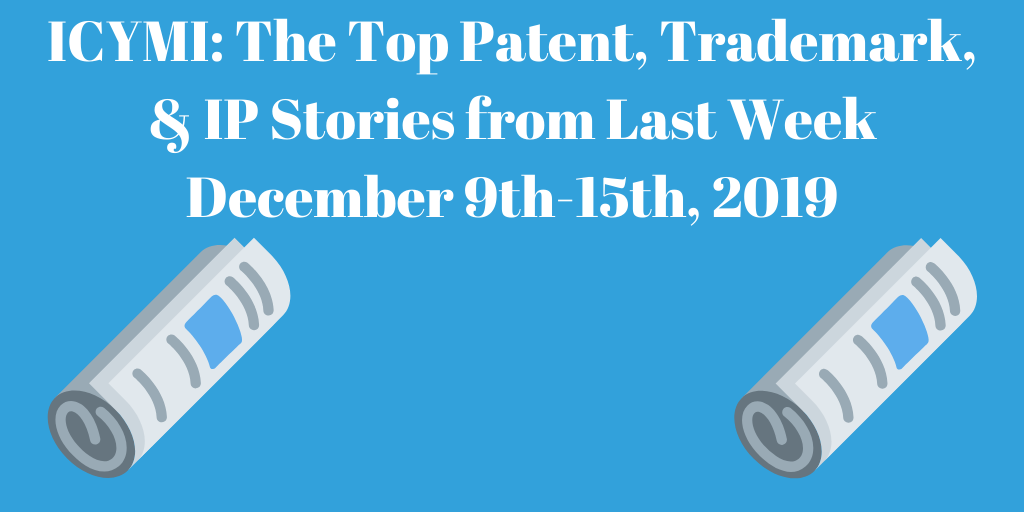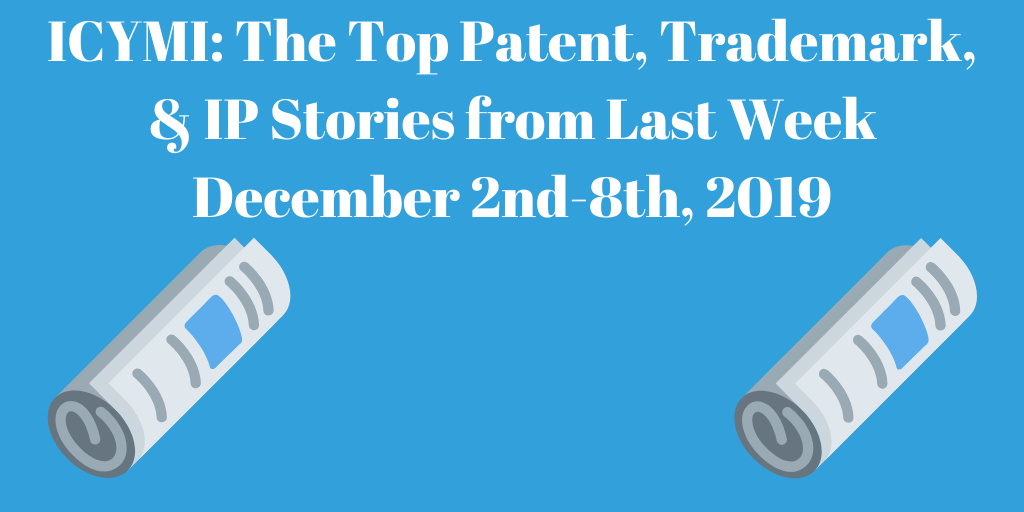Top Patent, Trademark, and IP Stories from Last Week (6/10-6/16/19)
Every week, we will be highlighting the top patent, copyright, trademark, intellectual property, etc. stories of the previous week in our “In Case You Missed It” segment. The list itself is in no particular order and includes a wide range of stories from the patent world that are informative, noteworthy, or just plain bizarre. The stories included encompass everything from Supreme Court cases to insights into growing industries. Please feel free to comment your thoughts on the stories or share an important one we missed!
“High Court Shuts Patent Office Door on Government Challenges”
In 2011, Return Mail Inc. sued the United States Parcel Service for patent infringement, alleging the agency used their patented method of processing undeliverable mail (without address information, for example) without permission. In 2014, the USPS filed a petition to the USPTO, arguing the patent was ineligible in the first place and pushed for a review of the patent’s validity. In response, Return Mail argued the USPS does not have standing to challenge a patent according to the Leahy-Smith America Invents Act because they are not a “person.”
As the act reads, a “person who is not the owner of a patent may file with the Office a petition to institute an inter partes review of the patent.” The Court of Appeals for the Federal Circuit rejected Return Mail’s argument, ruling the government is not excluded from the definition of “person” in the America Invents Act. In February 2019, the Supreme Court heard the case and on June 10th, they made their decision.
In their 6-3 decision, the Supreme Court ruled that the government is in fact excluded from the definition of “person” in the America Invents Act and therefore cannot initiate a patent review. The opinion states that in the absence of a definition for “person” in the America Invents Act, the term “person” does not include “the sovereign,” and therefore excludes federal agencies. This is based on the Dictionary Act that does not include federal agencies under its “person” definition.
The decision will make it so government agencies cannot dispute patent validity they have a problem with. As IP attorney Matt Rizzolo points out, the ruling could have greater implications for agencies like the FDA and pharmaceutical patent disputes, for example. To read more about this story, click here (via Bloomberg Law, June 10th, 2019).
“Walmart Outpaces Amazon in Drone Patent Race”
As Walmart and Amazon continue to butt heads in their quest for e-commerce domination, the two companies have invested tremendous capital in getting packages to your door as quickly as possible. In April, Amazon announced it was spending $800 million to make one-day free shipping the norm for Prime customers. In response, Walmart announced in May it would roll-out one-day shipping- no membership fee required.

One of the most popular ways these retail giants see packages arriving to your doorstep in less than 24 hours is via drones. In this battle, Walmart is winning. According to WIPO filings, Walmart filed 97 drone-related patents in 2018, compared to Amazon’s 54. In 2017, Walmart filed 57 patents whereas Amazon filed 54. Despite such innovation at Walmart, in an announcement this month, Amazon said drone deliveries would begin “within months.”
Drone-related patents grew 34% worldwide between 2017-18 with China dominating the niche. Chinese drone manufacturer SZ DJI Technology Co. led the charge with over 250 patents in that time span. As for U.S. companies, Walmart filed the most. To read more about this story, click here (via Financial Times, June 16th, 2019).
“U.S. Asks WTO to Temporarily Pause Its IP Dispute With China”
On Friday, the U.S. suspended its World Trade Organization dispute with China until December 31st. The U.S. initially filed the dispute before tariffs were enacted in response to China’s intellectual property theft practices and regulatory policies. The move comes after China began reversing some of its previous IP policies in the beginning of the year following international pressure.
In the WTO complaint, the U.S. argued the Chinese policies in place were “denying foreign patent holders, including U.S. companies, basic patent rights to stop a Chinese entity from using the technology after a licensing contract ends.” China has been known to demand foreign companies transfer technology and disclose trade secrets in order to gain entry into the Chinese marketplace. As the U.S. and China gear up for their meeting at the G20 summit next week, do not be surprised if China eases up on more IP regulations thereafter. To read more about this story, click here (via Bloomberg, June 14th, 2019).
“Court to Hear Led Zeppelin ‘Stairway to Heaven’ Copyright Appeal”
In 2016, classic rock band Led Zeppelin won a copyright lawsuit against them in which they were alleged of stealing a riff from Spirit’s “Taurus” for their iconic song “Stairway to Heaven.” The suit was grounded in the fact that the two riffs sounded similar and the two bands appeared at the same show early on in their careers. Last week, the U.S. Court of Appeals for the Ninth Circuit stated it will review the previous decision.
The decision to review comes after the fact that jurors in the 2016 case were not able to hear side-by-side recordings of the songs in order to determine if there were similarities. In a 2018 appeal, the United States District Court for the Central District of California concluded that the court abused its discretion by not allowing the sound recordings of ‘Taurus’ to be played to prove access.” The trial is set for September. To read more about this story, click here (via Forbes, June 12th, 2019).
BONUS READ: “The Patents Behind Toy Story’s Beloved Characters”
With another beloved Toy Story movie about to take over the box office, this article by the Smithsonian is a cool read. In it, the article covers the real-life patents behind some of the most iconic characters in the Toy Story franchise, complete with patent drawings of the toys and their history. Check it out here.





